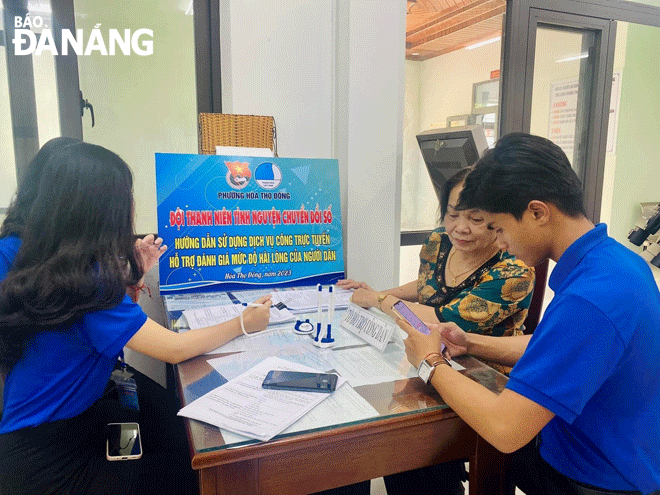Da Nang achieves outstanding results in digital transformation 2023
In 2023, most of Da Nang's digital transformation-related targets and tasks were completed beyond plan, thereby bringing many efficiencies to the local government and people.
 |
| The digital economy achieved many positive results in 2023. IN PHOTO: Employees working at the Unitech Joint Stock Company based in Hai Chau District. Photo: M.Q |
Many results recorded in all fields
As for digital government, the municipal-level Intelligent Operation Centre (IOC) and district-level Operation Centre (OCs) were put into operation in the city on August 14, 2023.
IOC (phase 1) inherits and uses instant data from 400 sensor stations outside the city, excluding cameras, and data from existing municipal, central and community applications. The centre, thereby, conducts focused analysis, and provides 140 types of statistics and visual charts and 50 types of early warnings and forecasts. This serves the management work, and policy and decision making of all-level leaders, as well as synthesising, editing, publishing and publicising the information to residents and businesses on information channels.
During the year, the city prioritised connecting the information system to handle administrative procedures with the national population database to exploit three data services and create digital records, thereby cutting down input documents such as copies of citizen identification cards, identity cards, and residence certificates.
To date, there have been nearly 180,000 transactions and searches, with a monthly average of 15,000 transactions and connections.
Regarding the digital economy, the city's information and communications industry earned an estimate of VND36,571 billion in revenue, reaching 101.03% of the plan, and an increase of 6.6% compared to 2022.
Software export turnover generated US$147. 8 million, representing 101.25% of the year's plan, and a rise of 12% against 2022.
The city houses more than 2.3 digital technology enterprises per 1,000 inhabitants, nationally ranking second, after the southern metropolis of Ho Chi Minh City, more than three times higher than the national average rate of 0.7 digital technology enterprises per 1,000 people in the country.
With a regard to digital society, Da Nang ranks first nationwide in term of the number of people using mobile phones, with a rate of 276 mobile phones/100 people, and 105 smartphones/100 people. On average, there are nearly 2 social network accounts per person.
The number of active transaction accounts at banks or other authorised organisations of people aged 15 and over is more than 3.55 million accounts, 5 times higher than the number of people aged 15 and over (683,570 people). Basically, each person has an electronic health record combined with a unique ID code. Each student has a unique ID code attached to the electronic school record.
In term of digital data development, the Da Nang Open Data Portal has so far provided nearly 1,000 data sets and integrated 100% of data sets into the National Data Portal.
More than 1,100 agencies, businesses, organisations and individuals have registered user accounts with about 5 million visits to search, exploit and look up information.
The city's Open Data Portal has been connected to the National Data Portal (data.gov.vn), especially has been shared for use by 10 agencies and localities in other provinces and cities across the country.
The city has established a shared data warehouse to collect, integrate, standardise and share data for agencies to exploit and use.
Notably, the city has fully implemented information security in 4 layers as required in Prime Minister-issued Directive No. 14 dated June 7, 2019.
 |
| Youth Union members in Hoa Tho Dong Ward, Cam Le District, supporting people in using online public services. Photo: M.Q |
Digital transformation targets completed
On March 4, 2023, the Da Nang People's Committee issued Plan No. 56 on implementing digital transformation tasks in 2023 with the theme "Unlocking data sources to create new value" with the following goals on digital government, digital economy and digital society.
To date, the city has completed all nine digital economic targets. Specifically, the digital economy accounts for 19.76% of the city's gross regional domestic product (GRDP), and the information technology industry 12% (2025 target is 10%).
100% of the city-based enterprises use electronic invoices. The city's revenue from e-commerce reaches 12% (nationally 8.5%). 50% of small and medium-sized enterprises use digital platforms. The city completed 8 out of the 9 digital society targets. The 5G service coverage target has not yet reached 20% because it is still on a trial basis.
Meanwhile, the city has already completed all 12 targets relating to digital government. In particular, 100% of public administrative services have qualified for full implementation. 100% of non-one-stop services have been provided at level 4. 100% of reports from State administrative agencies have been carried out online ( the nationwide rate of 50%). 100% results of administrative procedures have been digitalised. 96% of online public services have had generated records (nationwide 90%) . 94% of public administrative records have been made online (national target 60%). 82% of online public services have been integrated into the national public service portal (national target 40%). 45% of adults have had a digital account and a personal digital data warehouse on the system (25% nationwide). 82% of State agencies have provided open data.
Mr. Tran Ngoc Thach, Deputy Director of the municipal Department of Information and Communications, said that besides the results achieved, the city still had problems. In particular, some mechanisms, policies or issues relating to data connection and sharing between central and local agencies were still hierarchical. Digital data was fragmented, whilst data quality was low.
To achieve better results, the city has proposed that the central government review, amend, and adjust current regulations or issue temporary guidance to facilitate the use of digital technology and digital data to solve current problems as well as create new products and values.
The city should lay an emphasis on unifying digital economy measurement methods, creating convenience in management and statistics work; as well as publicising regulations on management and sharing of open data and a list of open data prioritised by State agencies, Mr. Thach noted.
Reporting by MAI QUE - Translating by M.DUNG








